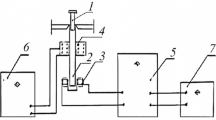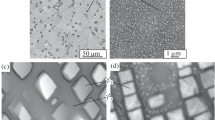Abstract
Measurements of fatigue crack growth rates in copper monocrystalline and polycrystalline sheet specimens have been made at 295 K and 77 K to determine mean stress effects on growth rates. When load conditions remained unchanged throughout the period of crack growth, the rate of fatigue crack growth is independent of the level of mean stress and depends only on the cyclic stress amplitude. When the mean stress is changed during the crack growth period, a reduction of mean stress under plane strain conditions causes complete cessation of growth. A similar effect was not observed in plane stress crack growth, presumably due to reduced elastic constraint in narrow specimens containing large cracks. No change in growth rates occurs if the mean load is increased. In the event of crack growth stoppage, either restoration of the full previous mean load or crack re-nucleation under continued cycling at the reduced load levels is sufficient to restore the prior growth rate. A simple model is adapted to explain these observations which emphasizes the interaction of the growth rate with compressive residual stresses generated at the tip of the propagating crack.
Similar content being viewed by others
References
N. E. Frost:Proc. First Int. Conf. on Fracture, Sendai, Japan September 1965, Vol. 3, p. 1433, Japanese Society for Strength and Fracture of Materials, 1966.
N. E. Frost, L. P. Pook and K. Denton:Eng. Frac. Mech. 1971, vol. 3, p. 109.
D. Broek and J. Schijve:National Aero- and Astronautical Res. Inst. Rept. NLR-TRM2.111,1963.
R. Roberts and F. Erdogan:J. Basic Eng., Trans. ASME 1967, vol. 93, p. 885.
R. A. Yeske: Ph. D. Thesis, Northwestern University, Evanston, Illinois, 1973.
R. D. McCammon and H. M. Rosenberg:Proc. Roy. Soc. London 1957, vol. A242,p. 203.
J. R. Dixon:Int. J. Frac. Mech. 1965, vol. 1, p. 224.
W. Elber:Eng. Frac. Mech. 1970, vol. 2, p. 37.
W. Elber:Damage Tolerance in Aircraft Structures, ASTM STP 486 1971, p. 230.
E. F. J. von Euw, R. W. Hertzberg, and R. Roberts:Stress Analysis and Growth of Cracks, ASTM STP 513 1972, p. 230.
U.C. Laird: FatigueCrack Propagation, ASTM STP 415 1967, p. 131.
J. Weertman:Proc. First Int. Conf. on Fracture, Sendai, Japan, September 1965, vol. l,p. 153, Japanese Society for Strength and Fracture of Materials, 1966.
J. Weertman:Int. J. Frac. Mech., 1966, vol. 2, p. 460.
J. Weertman:Int. J. Frac. Mech., 1969, vol. 5, p. 13.
J. Weertman:Int. J. Frac. Mech., 1973, vol. 9, p. 125.
Author information
Authors and Affiliations
Additional information
R. A. Yeske, formerly Research Assistant at Materials Science Department, Northwestern University, Evanston, III.
This paper is based on a portion of a thesis submitted by R. A. Yeske in partial fulfillment of the requirements of the degree of Doctor of Philosophy at Northwestern University.
Rights and permissions
About this article
Cite this article
Yeske, R.A., Weertman, J. Fatigue crack propagation under varied mean stress conditions. Metall Trans 5, 2033–2039 (1974). https://doi.org/10.1007/BF02644496
Received:
Published:
Issue Date:
DOI: https://doi.org/10.1007/BF02644496




